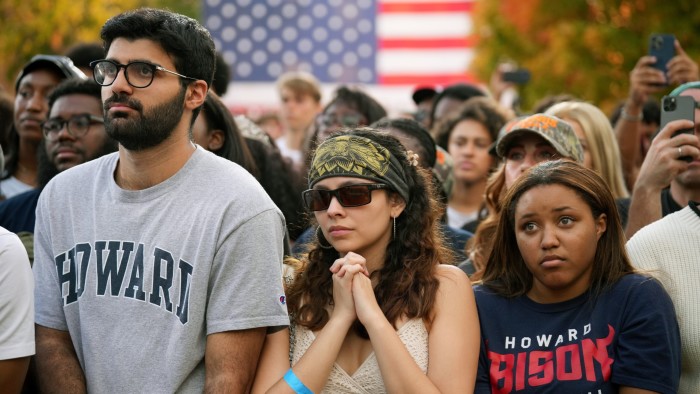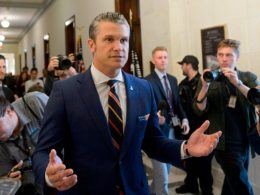Unlock the White House Watch newsletter for free
Your guide to what the 2024 US election means for Washington and the world
Donald Trump’s election has sparked a surge in the number of US students exploring whether to pursue their university education abroad.
Studyportals, a leading provider of information on higher education, said the number of searches by US students for foreign bachelors’ and masters’ courses jumped more than fivefold after Tuesday’s election, from a daily average of about 2,000 to nearly 11,000 on Wednesday when Trump’s victory was confirmed.
The greatest interest was for courses in the UK, Canada, Germany and Ireland, offering fresh hopes to universities in those countries which have been seeking more foreign applicants, who typically pay higher fees, to offset rising budget pressures.
The reaction comes amid falling enthusiasm for university studies in the US, where polls have shown falling confidence in higher education since 2015, led by Republican voters.
Trump and other senior Republicans have attacked elite universities over their high and rising tuition costs, concerns over restrictions on freedom of speech, and antisemitic and anti-Muslim protests. College students have traditionally been more liberal than the average US voter, although conservatives have gained some ground on campuses in recent years.
Edwin van Rest, Studyportals chief executive, said: “It is unprecedented to see a rapid shift in interest of this magnitude. We saw similar trends in the last Trump presidency, but not at this scale.”
The rising interest may not result in growing numbers ultimately applying abroad, which remain modest. Fewer than 190,000 US undergraduates — less than 6 per cent of the total — spent time in foreign universities in 2022.
One University of Pennsylvania student said she was considering switching her PhD application to a UK university following the election. She cited “the general attitude toward science and evidence” in Trump’s statements and concern for her safety “as someone who identifies as female and as a person of colour”.
She described the mood among fellow students this week as “abysmal”, saying there was an “atmosphere of despair on campus”.
Adeline Shelton, a final-year student at Lake Travis High School in Austin, Texas, who was already planning to apply to UK courses, said “a couple of friends” had expressed interest in studying abroad as a result of Trump’s election but most wanted to stay in the US. “People are saying it’s a fight that we should still fight, to try to make change rather than move away.”
Studyportals found the number of foreign students searching for US college places also dropped in recent days, but less sharply.
The University of Toronto said it was too early to identify any shifts in application trends, but it experienced a 12-fold increase in searches to their websites from US students shortly after Trump’s election in 2016, which also helped it recruit some leading US academics.
Advisers at Crimson Education, a university admissions consultancy, said they had seen some clients switch their focus within the US to colleges in more liberal states; and some in other countries who chose UK institutions over those in the US when Trump was first elected in 2016.
Jamie Beaton, Crimson’s chief executive, cautioned the experience of Trump’s previous presidency suggested elite Ivy League colleges in the US remained more appealing to foreign students than competitors elsewhere such as Oxford and Cambridge, and most prospective students were not swayed by election results.
“People are taking a 20-year view on the value of their education,” he said.
Source link









